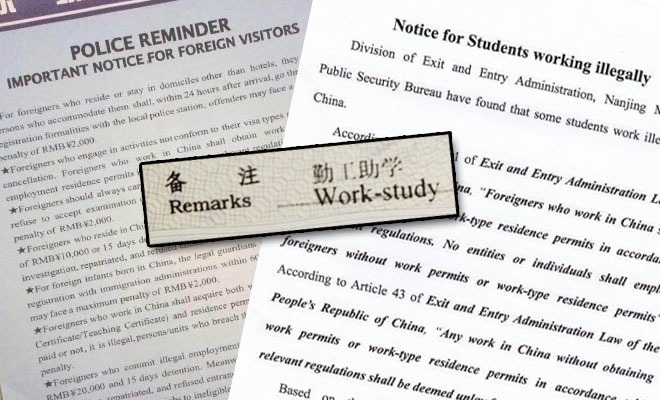Everyone understands; you’ve packed up your entire life, told of your impending adventures and new life abroad, said goodbye to family and friends and relocated to China, only to find out you may be getting shipped right back, due to one missing piece of paper, you can’t find a flat in time or you don’t meet certain requirements.
Unless you have managed to come to China unscathed by the visa process in some way or another, you have probably been through your fill of hair-raising rigmarole. Apart from those qualifying, thanks to a Mutual Visa Exemption list, every foreigner in China is tied to a certain type of visa. For most of us in humble Nanjing, we will be linked to a working visa or study visa. In some rarer cases, Nanjing is also home to some spousal, business or tourist visa holders. In most cases, 1 year is the maximum time allotted before one is required to renew. At present, mainland China has 16 “ordinary” visas available for persons who wish to cross the border. All 16 are subject to the same rule; do not violate the terms of your visa.
If any visitor to China violates the terms of his or her visa, there will no doubt be repercussions; anyone, anywhere in the world for that matter, would be punished for violating the terms of a visa. It was only 5 years ago that all international students in Nanjing were subject to the same rule; no working whatsoever, no matter who you are, how long you have been here or how good your Mandarin is.
With this week’s emergence of official government letters, and reports of classroom, workplace and home visits by police, spontaneous interrogative interviews by universities and on the spot checks, it seems this rule still firmly applies. However, the argument often heard on the street is that it is universally known that students do not come with deep pockets, nor do the majority have the financial support they need from their families.
Most surprising about all of this is the lack of any official notice that gives international students the most up-to-date knowledge regarding how to do the right thing; mainly that students were in fact given the opportunity to legally work in Nanjing last year, providing they are approved for a work-study visa. Perhaps this opportunity is reserved for the very best students who have had time to prove themselves, but why not make it known that the option is there and worth striving for? Could this perhaps curb illegal working?
The “Notice for Students working illegally”, issued and stamped by the International Students Office that circulated a few days ago on WeChat, clearly states that “foreigners who work in China shall obtain work permits and work-type residence permits”, so does work-type residence permit allow students to work? This is not clear.
While the study abroad for the middle class option only really kicked off in the West during the late 1990s, the concept and increasing influx of international students coming to China is still relatively new. Setting about putting appropriate systems in place always takes time and for the expat student population in Nanjing, while ground level formalities remain unclear and changeable, the grander plan is slowly becoming clearer.
Study exchange programs between Japan and Australia, Europe and America have been a success at keeping top talent abroad. It seems China is now adopting the same method. In order to obtain a working visa in China, 2+ years working experience is required. It does not make sense to spend 4 years training a foreigner in the finer arts of Mandarin and cultural diplomacy, for them to go back home after graduation because they do not meet work experience requirements.
Allow students who are dedicated to the country, the language and culture to work, and reap the benefits.











